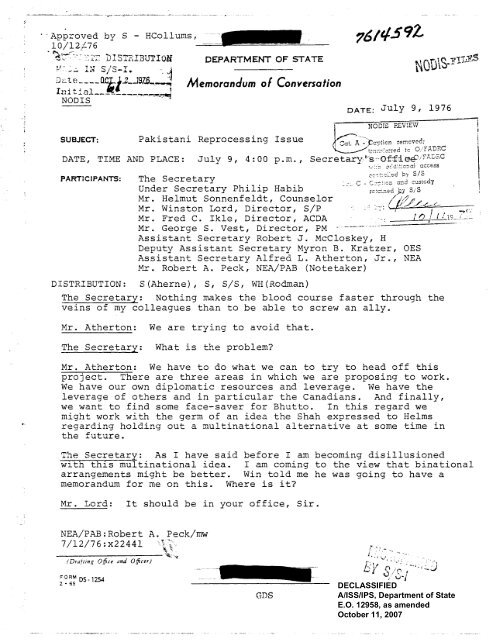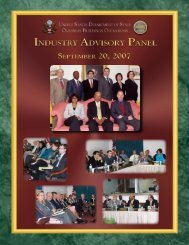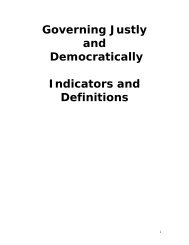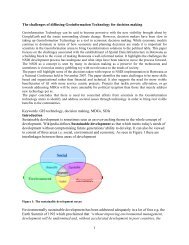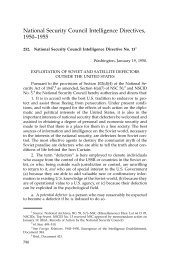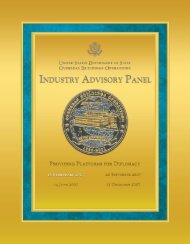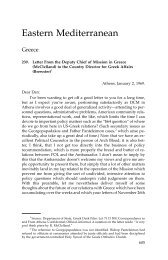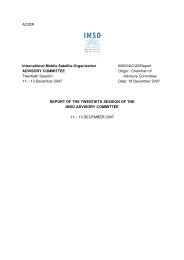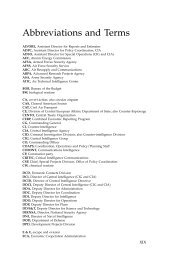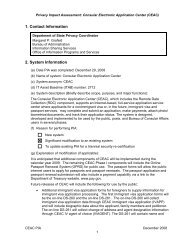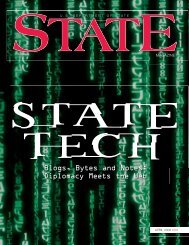PDF version - US Department of State
PDF version - US Department of State
PDF version - US Department of State
Create successful ePaper yourself
Turn your PDF publications into a flip-book with our unique Google optimized e-Paper software.
Appzoved by S - HCollums,<br />
10/12;76<br />
'h +%\-, - -. . -,-,-<br />
-<br />
.Aa SIE~~IYIJTIOEI DEPARTMENT OF STATE sOD;~~~~<br />
KC' a; XX S/'S-I,<br />
-. :I<br />
3c-te----Qf&ifJ-JSK, Memorandum <strong>of</strong> Conversation<br />
Initial ,,-,-,,,~.-pp+ 1<br />
NODIS<br />
DATE: July 9, 1976<br />
- 761 4592<br />
i I<br />
NODIS PEVIEVJ? i<br />
SUBJECT: Pakistani Reprocessing Issue cot1,, ;.~cv~Z; i<br />
ut;2--'3rred :c 0 FAC?IC<br />
.. -- J
Mr. Ikle: Under some circumstances, multinational projects<br />
could simply end up spreading the problem.<br />
Mr. Vest: Binational and multinational are not exclusive<br />
concepts. We consider the binational concept simply to be the<br />
very minimum type <strong>of</strong> this sort <strong>of</strong> arrangement.<br />
The Secretary: When all is said and done what matters is the<br />
penalty for kicking out the non-national element or the penalty<br />
for getting rid <strong>of</strong> the supplier. I don't see why it is any<br />
better for Pakistan and Iran to have a joint facility. It<br />
doesn't add any restraint on either <strong>of</strong> them.<br />
Mr. Lord: No. In fact it would be worse. It would give the<br />
technology to boL5 parties. Our idea is not to encourage a<br />
joint Pakistan-Iran facility, but to permit the Shah to hold out<br />
the prospect <strong>of</strong> an eventual multinational project which would<br />
give Bhutto a way to save face and would buy time for us in the<br />
region.<br />
The Secretary: I have just told the Germans that we oppose<br />
such an arrangement. I must say that now that I have had a<br />
chance to take a closer look at the FRG-Iran agreement it is<br />
not such an irresponsible commitment. If I had known the<br />
details earlier I might not have raised objections.<br />
Mr. Lord: The Iran-Pakistan arrangement would only involve an<br />
agreement in principle.<br />
The Secretary: Look. A reprocessing plant in Japan in which Korea<br />
would participate is a way to hold down Korea, not Japan. It<br />
actually adds to Japan's capability. All they have to do is<br />
kick out the Koreans. The desire <strong>of</strong> Iran and Pakistan for this<br />
capability is about equal and a binational facility would give<br />
them equal access to plutonium.<br />
Mr. Ikle: The proposal might actually accelerate the introduction<br />
<strong>of</strong> reprocessing technology into the area.<br />
Mr. Habib: We are not thinking about an absolute commitment,<br />
-- - -- . -<br />
just an agreement in principle which would give Bhutto some logrical<br />
explanation for giving up his present project.<br />
Mr. Ikle: The timing is wrong.<br />
DECLASSIFIED<br />
A/ISS/IPS, <strong>Department</strong> <strong>of</strong> <strong>State</strong><br />
E.O. 12958, as amended<br />
October 11, 2007
The Secretary: He didn't say he is going to buy it now.<br />
Mr. Habib: What kind <strong>of</strong> plant is this?<br />
Mr. Vest: It is a very large pilot plant, in fact four times<br />
that the French proposed to sell to Korea.<br />
The Secretary: I must say I have some sympathy for Bhutto in<br />
this. We are doing nothing to help him on conventional arms, we<br />
are going ahead and selling nuclear fuel to India even after<br />
they exploded a bomb and then for this little project ,we are<br />
coming down on him like a ton <strong>of</strong> bricks.<br />
Mr. Kratzer: The difference between the Indian and Pakistani<br />
cases is that Bhutto came in second.<br />
Mr. Ikle: We don't like what the Indians are doing either.<br />
The Secretary: But we are not doing anything about it.<br />
Mr. Lord: Mr. Secretary, you should know <strong>of</strong> intelligence<br />
reports which indicate that the Pakistanis already have a<br />
laboratory-scale facility.<br />
Mr. Ikle: There is an important difference between the Pakistani<br />
and the Indian cases. The Pakistani reprocessing project doesn't<br />
fit into a power program while the Indians at least have an<br />
extensive power program which could conceivably utilize this<br />
sort <strong>of</strong> technology.<br />
Mr. Habib: Does Pakistan have a heavy water facility?<br />
Mr. Kratzer: No.<br />
Mr. Ikle: Pakistan's only present reactor is a heavy water<br />
facility - which does not use enriched fuel and therefore cannot<br />
utilize the plutonium which might be recovered from a reprocessing<br />
facility.<br />
The Secretary: Is Pakistan buying a power reactor too?<br />
Mr. Kratzer: They are shopping for a light water reactor and<br />
have approached us in this regard.<br />
The Secretary: You mean they are starting with a reprocessing<br />
plant?<br />
Mr. Vest: Yes.<br />
DECLASSIFIED<br />
A/ISS/IPS, <strong>Department</strong> <strong>of</strong> <strong>State</strong><br />
E.O. 12958, as amended<br />
October 11, 2007
The Secretary: What are they going to reprocess?<br />
Mr. Kratzer: The small Canadian reactor provides spent .<br />
fuel which can be reprocessed but the recovered plutonium can't<br />
be used to refuel that Canadian reactor because it doesn't re-<br />
quire enriched fuel.<br />
Mr. Habib: That is just what the Indians did.<br />
The Secretarv: Why would it not be better to wait on all this<br />
until I go to Iran?<br />
Mr. Vest: There would be one problem and that relates to the<br />
Canadians. The Canadian cabinet is meeting July 22 to make<br />
a decision on the course <strong>of</strong> their own negotiations with Pakistan.<br />
They deserve to know what we intend to do.<br />
Mr. Sonnenfeldt: We could probably get them to delay that decision.<br />
The Secretary: I am seeingtlacEachen on the 30th and could talk<br />
with him at that time. It is not going to be hard to get the<br />
Canadians not to sell a reactor.<br />
Mr. Ikle: If the Canadians sold a reactor thePakistanis would<br />
have to agree to tight controls over reprocessing <strong>of</strong> the spent<br />
fuels.<br />
Mr. Kratzer: The issue for the Canadians is not the sale <strong>of</strong> an<br />
additional reactor. Canada is trying to renegotiate their<br />
present agreements with Pakistan to provide for assurances and<br />
better controls in return for which they would continue to help<br />
the Pakistanis operate the reactor they already have.<br />
to<br />
Mr. Vest: Whatever we do we owe it/them - to let them know what<br />
our intentions are.<br />
Mr. Ikle: Would there be any value in getting into technical<br />
discussions with the Pakistanis on the whole issue <strong>of</strong> the<br />
technical end <strong>of</strong> reprocessing and the economics <strong>of</strong> this tech-<br />
nology?<br />
The Secretary: Bhutto knows the technological details and<br />
he knows what he wants.<br />
Mr. Habib: That's right. And what he wants is to build a<br />
bomb.<br />
DECLASSIFIED<br />
A/ISS/IPS, <strong>Department</strong> <strong>of</strong> <strong>State</strong><br />
E.O. 12958, as amended<br />
October 11, 2007
The Secretary: If you were in his place you would do the<br />
same thing.<br />
Mr. Lord: The first decision we must make is whether we want<br />
to lean on Bhutto more, to apply some leverage. Secondly, we<br />
need to decide how to convince him that there is a better way<br />
to achieve his objectives and that is where the concept <strong>of</strong> a<br />
multinational alternative comes in.<br />
The Secretary: Bhutto has already agreed to that.<br />
Mr. Vest: But what he has agreed to is a facility with Iran<br />
located in Pakistan,and that gives us serious problems.<br />
The Secretary: We can't tell him both that he must have a<br />
multinational facility - and that it must be located outside his<br />
own country. Suppose Rhutto says, "All right, as soon as you<br />
get a reprocessing plant established in Iran I will be happy<br />
to give up my project. "?<br />
Mr. Ikle: Would it be possible to get him to agree to indefinite<br />
postponement?<br />
The Secretary: I see nothing to gain from a multinational plant.<br />
We can't tell Bhutto that he must have a multinational plant but<br />
that it can't be located in Pakistan because then you would have<br />
us going to the Shah and telling him he also can't build it in<br />
Iran.<br />
Mr. Sonnenfeldt: If we did not object, the Germans would have<br />
a right to complain about why we objected to their agreement.<br />
The Secretary: Knowing what all I know now, I would not complain<br />
to the Germans about their agreement. It is not an irresponsible<br />
agreement. It is indistinguishable with what we have agreed to<br />
with Iran. Perhaps it is even somewhat better because the Germans<br />
have establishedL that it is ten years down the road.<br />
Mr. Habib: Have we exhausted all our diplomatic avenues with<br />
the French?<br />
Mr. Vest: Yes.<br />
Mr. Sonnenfeldt: It is possible to tell the Germans that we have<br />
studied this thing and changed our minds.<br />
DECLASSIFIED<br />
A/ISS/IPS, <strong>Department</strong> <strong>of</strong> <strong>State</strong><br />
E.O. 12958, as amended<br />
October 11, 2007
Mr. Kratzer: One thing in regard to the French that we should<br />
keep in mind is that they are probably not prepared to stand<br />
aside like they did in the Korean case. We might, however,<br />
consider trying to channel the Pakistani interest into a French-<br />
built light water reactor.<br />
The Secretary: The way we are going, we are guaranteeing markets<br />
to the Europeans who will be making reprocessing agreements all<br />
over the world.<br />
Mr. Habib: How would you explain this to Westinghouse and GE?<br />
Mr. Kratzer: But there has to be something in this for the<br />
French. The French aren't going to give up this time.<br />
Mr. Sonnenfeldt: Perhaps we could get the Pakistanis to as-<br />
sociate themselves with the German-Iranian arrangement.<br />
Mr. Kratzer: I am thinking more <strong>of</strong> an arrangement under which<br />
Pakistan could get a French reactor in place <strong>of</strong> the reprocessing<br />
plant.<br />
The Secretary: How would they pay for it?<br />
Mr. Kratzer: There are billions <strong>of</strong> dollars worth <strong>of</strong> reactors<br />
being sold all over the world, and somehow these countries are<br />
paying for them.<br />
Mr. Vest: We have looked at the possibility <strong>of</strong> credits if we<br />
were to sell a reactor to Pakistan, but it is my impression that<br />
Eximbank is down on Pakistan.<br />
Mr. Peck: That is true.<br />
The Secretary: I notice we are cutting <strong>of</strong>f arms again to Pakistan.<br />
Mr. Atherton: That is one option; not to actually cut <strong>of</strong>f arms<br />
but to hold up on some important items.<br />
The Secretary: Is it not true that you are already hold=ng<br />
them up?<br />
Mr. Atherton: Not tr~e. But it is coming to that. We will<br />
have to make a decision whether to send some <strong>of</strong> these items<br />
forward and frankly we can see some utility in holding them<br />
for leverage.<br />
DECLASSIFIED<br />
A/ISS/IPS, <strong>Department</strong> <strong>of</strong> <strong>State</strong><br />
E.O. 12958, as amended<br />
October 11, 2007
The Secretary: But you are already holding them up. Right?<br />
Mr. Atherton: No, that's not exactly true. We have sent the<br />
TOW missile case forward, for example.<br />
The Secretary: The fact is you have been dragging your feet.<br />
Mr. Atherton: Well, we have not been pushing.<br />
The Secretary: The Pakistani Ambassador told me that these<br />
cases are being delayed.<br />
Mr. Atherton: I had lunch with him two days ago and he said<br />
he was satisfied with the progress we are making. It is true<br />
that these cases are not being accelerated.<br />
The Secretary: I ordered you to accelerate these cases when<br />
the Pakistani Ambassador complained to me three months ago.<br />
Gentlemen, there are few countries in the world which by neces-<br />
sity or choice are still allies <strong>of</strong> ours. There is something<br />
indecent about our always proving that we are strong by kicking<br />
our allies in the teeth. We told the Pakistanis one year ago<br />
that we would provide military equipment. We also told the<br />
Chinese. This is against my instructions that we are not moving<br />
forward. When did I see the Pakistan Ambassador? He is a very<br />
intelligent man and he believes we have been holding back.<br />
Mr. Atherton: Mr. Secretary, after you saw the Pakistan Ambas-<br />
sador we reviewed the situation and have tried to move forward.<br />
There have been some delays because the Pakistanis have changed<br />
their minds. They withdrew an ammunition order, for example.<br />
Mr. Habib: How do you feel about the A-7?<br />
The Secretary: NEA wants to kill the A-7 on its own merits.<br />
Mr. Habib: Does the A-7 give us credible leverage?<br />
iMr. Atherton: I don't think using the A-7's alone will work.<br />
We need to put in the balance the total military supply relation-<br />
ship. Bhutto can go elsewhere for aircraft.<br />
The Secretary: To whom?<br />
Mr. Atherton: To the British or to the French for Mirages.<br />
The Secretary: The question here is does the Bureau have the<br />
right to refuse my direct orders. We went through this in 1971<br />
with NEA.<br />
DECLASSIFIED<br />
A/ISS/IPS, <strong>Department</strong> <strong>of</strong> <strong>State</strong><br />
E.O. 12958, as amended<br />
October 11, 2007
Mr. Atherton: Mr. Secretary, this is a different Bureau now and<br />
we are not disobeying your orders. You should decide if we want<br />
to go ahead and eliminate this as a part <strong>of</strong> our strategy.<br />
Mr. Ikle: There is other leverage provided by the Symington<br />
Amendment. The Pakistanis hrould lose all their economic as-<br />
sistance because <strong>of</strong> this project.<br />
The Secretary: Let's get this straight. You are holding up<br />
everything except the TOWs.<br />
Mr. Atherton: No. The TOWs is just the most important case<br />
which we have sent forward. I'll check with Defense and get<br />
the details for a report to you. The Pakistanis have had trouble<br />
making up their own minds on a number <strong>of</strong> these cases.<br />
Mr. Peck: Our Embassy in Islanabad just completed a study <strong>of</strong><br />
our experience. Since the ~tnlbargo was lifted a year ago, the<br />
Pakistanis have asked for 43 cases. Of these, 21 LOAs have<br />
already been signed. Most <strong>of</strong> the others have been held up be-<br />
cause the Pakistanis have either not accepted the cases, have<br />
asked for revisions, or have changed their minds. There were<br />
only seven cases <strong>of</strong> unusual delay and four <strong>of</strong> these are naval<br />
items which require special Congressional action.<br />
The Secretary: Twenty-one <strong>of</strong> 43 is less than half. Less than<br />
half in over one year does not indicate a spectacular effort on<br />
our part.<br />
Mr. Habib: Do you want to use miiitary supply as leverage? If<br />
we don't apply some leverage, then Bhutto will interpret it to<br />
be a free ride.<br />
The Secretary: This would be the first country in which we were<br />
applying this sort <strong>of</strong> 1evera.ge.<br />
Mr. Habib: We applied leverage on Korea but it was <strong>of</strong> a dif-<br />
ferent sort.<br />
Mr. Atherton: I see no problem in putting these other cases<br />
forward while holding back on the A-7's if that is what you want<br />
to do.<br />
The Secretary: That is absolutely right. We started this<br />
military supply relationship with the Pakistanis with great<br />
fanfare and have delivered nothing. There is no leverage in<br />
interrupting something that we are not giving anyway.<br />
DECLASSIFIED<br />
A/ISS/IPS, <strong>Department</strong> <strong>of</strong> <strong>State</strong><br />
E.O. 12958, as amended<br />
October 11, 2007
Mr. Habib: Is it possible to put together a package <strong>of</strong><br />
attractive inducements such as we had for Korea?<br />
Mr. Kratzer: Those inducements in the Korean case were<br />
largely window dressing.<br />
The Secretary: Is it a plausible policy for us to make our<br />
ally Pakistan totally dependent on Indian good will? The Pakistanis<br />
don't even have the appearance <strong>of</strong> a credible defense. What they<br />
have asked for from us is piddling cornpared to what the Indians<br />
have. I don't think it adds to the stature <strong>of</strong> the United <strong>State</strong>s<br />
to force an ally to be defenseless. Now, if we were giving him<br />
something important we might have some leverage but this stuff is<br />
just junk. FMS credits would give us some leverage. Letting<br />
this stuff go forward does not preclude using arms as leverage<br />
at a later date. What is it that you have been holding up?<br />
Mr. Atherton: The things which we could put forward now are<br />
torpedoes, artillery, Sidewinder missiles, an Air Force study<br />
<strong>of</strong> Pakistan's air defense system, minesweepers and APC's.<br />
The Secretary: How many APC's.<br />
Mr. Peck: About 300, I think.<br />
The Secretary: This is what I want to do. First, the only way<br />
we are going to get him <strong>of</strong>f this reprocessing plant is to give<br />
him a reactor and accept the same terms as the FRG-Iran agreement.<br />
Secondly, we should tell him that we will take steps to enhance<br />
his conventional defense. We can't tell Bhutto that he can't have<br />
either a conventional or a nuclear defense.<br />
Mr. Habib: That would not be a bad package. We could also<br />
throw out FMS credits.<br />
Mr. Sonnenfeldt: We would have trouble in Congress.<br />
The Secretary: There have been no screams from Congress over the<br />
FRG-Iran agreement.<br />
Mr. Sonnenfeldt: That is because the chief screamer is running<br />
for Vice President.<br />
Mr. Lord: The recess <strong>of</strong> July 4 has probably also helped.<br />
Mr. Sonnenfeldt: We would have to get the French to agree to<br />
do it.<br />
DECLASSIFIED<br />
A/ISS/IPS, <strong>Department</strong> <strong>of</strong> <strong>State</strong><br />
E.O. 12958, as amended<br />
October 11, 2007
The Secretary: How are the Pakistanis paying for reprocessing?<br />
Mr. Kratzer: I assume there must be French credits. It costs<br />
one to two hundred million dollars. This proposal would cause<br />
problems for the French because the French company selling the<br />
reprocessing is different from the company which would sell the<br />
reactor, though in total it would be a better deal for French<br />
exports .<br />
Mr. Vest: We have made a lot <strong>of</strong> progress with the French in the<br />
last one and a half years but they are very sour at the moment.<br />
The Secretary: The French might stop selling reprocessing plants<br />
if everyone else would.<br />
Mr. Vest: But only after this one.<br />
Mr. Habib: Anyone who is not embarrassed to sell two reactors<br />
to South Africa would not be embarrassed to sell a reprocessing<br />
plant to Pakistan.<br />
Mr. Atherton: What should we do about India in the meantime?<br />
The Secretary: What do we have to decide?<br />
Mr. Vest: The Canadians have to decide whether to stop cooperating<br />
with Pakistan like they did with India or whether to continue under<br />
an improved agreement. It is important for them to know what your<br />
tactical plan is, and if we are not doing anything until you go<br />
there.<br />
Mr. Habib: Where do' the Pakistanis get their heavy water?<br />
Mr. Kratzer: From Canada. The Canadians in some ways have more<br />
leverage than we do. The Pakistanis cannot continue to operate<br />
their reactor without Canadian help.<br />
Mr. Habib: Then why not let the Canadians do it all and we'll<br />
sell the arms.<br />
Mr. Kratzer: The Canadians do not have the same grounds for<br />
breaking <strong>of</strong>f cooperation with Pakistan as they did with India.<br />
There have been no overt violations on the part <strong>of</strong> Pakistan.<br />
Nr. Habib: The Canadians took the Korean issue seriously and<br />
there were no violations.<br />
DECLASSIFIED<br />
A/ISS/IPS, <strong>Department</strong> <strong>of</strong> <strong>State</strong><br />
E.O. 12958, as amended<br />
October 11, 2007
Mr. Kratzer: They have a signed agreement with Pakistan and<br />
they have no automatic right to demimd renegotiations. They<br />
are prepared, however, to threaten PaIristan with some degree<br />
<strong>of</strong> slow-down or abrogation.<br />
Mr. Vest: Then the Pakistanis are very much on the spot.<br />
The Secretary: I don't think I have succeeded in gztting my<br />
point across. Non-proliferation is not our only objective in<br />
South Asia. An imbalance is being created in which Pakistan<br />
is totally dependent on India. There is no question that we<br />
can break Pakistan's back because they have made the mistake<br />
<strong>of</strong> allying themselves with us. Secondly, I am not convinced<br />
that it will be all that simple to knock the French out <strong>of</strong> this<br />
contract.<br />
M r . Sonnenfeldt: Unless there were alternatives which wouId<br />
be attractive to the French.<br />
Mr. Vest: We are fully agreed on that. The problem for us is<br />
that if we want to go forward with our arms relationship, we<br />
may not be able to get it through Congress, particularly the<br />
A-7's.<br />
Mr. Kratzer: The Bureau wouldn't propose an A-7 sale anyway.<br />
Mr. Atherton: I can see us selling A-7's in the context <strong>of</strong><br />
getting something on reprocessing.<br />
Mr. Lord: ROY, am I correct in saying that you don't think<br />
A-7's will be enough to convince Bhutto? -<br />
Mr. Atherton: Yes, but it might work if it were clear that it<br />
was an indication <strong>of</strong> what more was coming. The point to make<br />
to Bhutto is that he has a practical problem here. Congress<br />
wouldn't approve an arms package if he goes ahead with reprocess-<br />
ing.<br />
The Secretary: We have to find a package which is conceivably<br />
acceptable to France, such as substituting a reactor sale for<br />
the reprocessing plant. If we give Bhutto A-7's in return for<br />
giving up the reprocessing plant, there would be unshirted hell<br />
to pay in France. If we can get them to switch a reactor for<br />
reprocessing, this could be completed with an overall agreement<br />
like that between the FRG and Iran.<br />
Mr. Sonnenfeldt: We will have to come up with a very complex<br />
package which someone must put down on paper.<br />
DECLASSIFIED<br />
A/ISS/IPS, <strong>Department</strong> <strong>of</strong> <strong>State</strong><br />
E.O. 12958, as amended<br />
October 11, 2007
Mr. Ikle: We can't do anything until someone talks with Bhutto.<br />
He wouldn't take this from Byroade.<br />
Mr. Atherton: I agree,but in Bhutto's last conversation with By-<br />
roade it appeared that he was beginning to understand our problem.<br />
The Secretary: I think I should go to Pakistan after Iran and lay<br />
this out frankly to Bhutto. I don't want this spewed all over the<br />
Government, though.<br />
Mr. Atherton: What about telling the Canadians?<br />
The Secretary: I am not in favor <strong>of</strong> the Canadians cutting <strong>of</strong>f<br />
the fuel supply.<br />
Mr. Vest: They should know that you will discuss reprocessing<br />
with Bhutto.<br />
The Secretary: That's all right.<br />
DECLASSIFIED<br />
A/ISS/IPS, <strong>Department</strong> <strong>of</strong> <strong>State</strong><br />
E.O. 12958, as amended<br />
October 11, 2007


